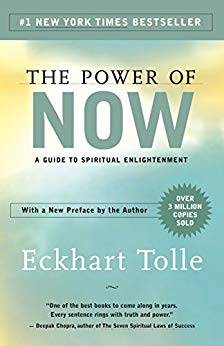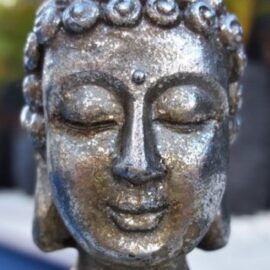

This article is an excerpt from the Shortform summary of "The Power of Now" by Eckhart Tolle. Shortform has the world's best summaries of books you should be reading.
Like this article? Sign up for a free trial here .
Do you feel a constant struggle in your life, like you’re resisting life and change? Does it feel like you’re not quite being true to yourself? The solution is to stop resisting – to let go, surrender, accept, and be present.
But all of that is easier said than done. In this guide, we’ll cover why you’re resisting, what it feels like, and how to stop resisting.
Resisting the Now Creates Pain
The power of Now is the power of being present. Presence is the only way to feel peace and true fulfillment. We’ve explored how not being present and resisting make us unhappy and unfulfilled, and how our ego uses thoughts and emotions to cause resisting and prevent us from being present. Now that we’ve identified the problem, we’re going to talk about how you can become more present, and how it will impact your life.
Being present does not change your external circumstances. In fact, life consists of cycles of success and failure; each one is a necessary precedent of the other. These cycles can last from a few hours to years, and are part of the inevitable impermanence of everything in life. (There are also cycles of highs and lows when it comes to your physical energy, productivity, and creativity.) Recognizing this is key to stop resisting.
When you are present, you must accept the lows as much as the highs as part of the reality of the Now. Why fight a cycle that is inevitable?
Much of the pain you experience is self-inflicted because you’re not accepting the reality of the present moment. The circumstances of your life — your “life situation” — can be unpleasant, but begrudging them does nothing to change the situation. When you resist the Now you are only creating negativity and unhappiness for yourself.
- Negativity manifests as irritation, anger, depression, despair, and resentment.
- This resistance even creates physical tension in your body. (e.g. Do you ever feel stiffness in your back and shoulders from stress? Or clench your jaw or grind your teeth without realizing it?)
When you feel resistance and negativity build in you, observe it. Put your attention on it, acknowledge it, and then drop it.
- If you can’t drop it, then accept it. Stop resisting it. Accept that you’re feeling this way, and avoid or judging or blaming yourself for that reaction.
- If you can’t drop it, you can also practice making yourself “transparent” to the irritation. Imagine the solidity of your body dissolving, and allow the irritant to pass right through you. Break down the “wall” inside you that the irritant (e.g. a loud noise, a rude comment, an inconvenient circumstance) is bumping up against, and let it pass through you.
It is true that external circumstances in your life can create challenges for you, and it may seem that stop resisting can only go so far. But these circumstances are merely “situations” unless/until you start labeling them as “problems.”
Rather than resisting the present because it can be unpleasant or painful, try to stop labeling things as good or bad and instead accept it as reality, as part of the cycle of highs and lows. Judging a present moment and circumstances as bad will make you want to resist it, which in itself will cause more pain. If you accept it as it is, then you can work with it (more on this later).
- Superficial changes can occur to seemingly improve your life, like winning the lottery. However, if you’re carrying pain from the past and don’t become more present in the Now, then you’ll still carry that pain into the future and will feel the same. You may have a bigger house, but you’ll still feel unfulfilled in it.
(It can be hard to make this argument to people who are dealing with real hardship. It might be more palatable to frame it by saying that presence and acceptance allow you to better deal with hardships, rather than succumb to them mentally and create added negativity around a situation you either can’t or haven’t yet changed. Presence, then, gives you more mental and psychological capacity to improve external challenges.)
How to Stop Resisting: Be Present. Practice Acceptance
If you are resisting some aspect of what exists in the Now, your focus is on how you wish the situation could be, or how it might improve later. You are not present. Presence requires accepting what is — or surrendering to the Now — without judgment. Stop resisting and accept what is. (We’ll talk more about surrender in the next section.)
Examples of judgment are thinking, “I wish I were doing something besides working on this report right now,” or “I can’t believe I’m stuck in this long line at the post office.” These are signs of resisting life.
Engaging only with each moment — and not with the past and future — allows you to break down problems to a more manageable size. When you isolate problems to just the present moment, you start to see that most problems only exist in the context of time.
Here’s an example of how to stop resisting:
- You are stressed about your pile of bills. These bills are due in the future. Granted, you can’t pretend like they don’t exist and delay action until your electricity is being cut.
- However, you can make a plan to budget your expenses or take on some extra shifts at work to make ends meet. Then, accept that there is no more that you can do in this moment.
- Recognize that your worry and stress are doing nothing to pay down your balance, only making you unhappy and potentially pulling your energy away from productive action (more on this later.
———End of Preview———

Like what you just read? Read the rest of the world's best summary of "The Power of Now" at Shortform . Learn the book's critical concepts in 20 minutes or less .
Here's what you'll find in our full The Power of Now summary :
- Why you feel pain from the past, and how to get rid of it
- How to be more present and stop worrying about the future
- The 8 key ways to achieve mindfulness






